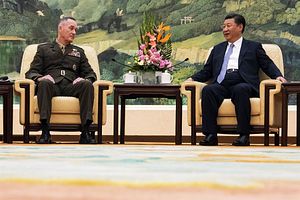It seems that both China and the United States are quite content with the top U.S. general’s first visit to China in his capacity.
On August 17, Chinese president as well as chairman of the Central Military Commission (CMC) Xi Jinping met U.S. Marine Corps General Joe Dunford, chairman of the Joint Chiefs of Staff, and discussed the North Korean issue in particular at the Great Hall of the People in Beijing.
This was Dunford’s first visit to China in his position, and he is the highest-ranking military official to visit China since U.S. President Donald Trump took office, said China’s defense ministry.
The highest-level meeting had been kept secret until the final moment. According to the statements later issued both by China’s defense ministry and by the U.S. Department of Defense, both sides expressed goodwill in the talks and were satisfied with the result.
On August 15, Dunford first visited China’s defense ministry and met his counterpart Fang Fenghui, chief of the People’s Liberation Army (PLA)’s Joint Staff Department. Both top military officials signed agreement to enhance military ties and build a new communication mechanism to reduce miscalculations.
On August 17, Xi first applauded the new progress made by the U.S. and Chinese militaries and then reaffirmed that China is ready to make joint efforts with the United States. According to China’s defense ministry, Xi hoped that the military relations would become a major stabilizing factor in Sino-U.S. ties. He said:
Despite some ups and downs in the development of bilateral relations, a rainbow comes after wind and rain…The general direction of Sino-U.S. relations not only concerns the fundamental interests of the two nations and their people, but also profoundly affects the overall international strategic situation.
The U.S. version of Dunford’s China visit looks more concrete and focused on the North Korean crisis.
Dunford said he is leaving Beijing feeling encouraged: “I think we’ve had a very transparent exchange with our Chinese interlocutors about North Korea…I do believe right now — there’s a long way to go — but we are on a path that there is a possibility, and I hope a probability, that we can resolve this [the North Korean threat] peacefully. I certainly believe there is a chance.”
Dunford will travel next to Tokyo following his meeting with the Chinese president, said the U.S. Department of Defense.

































